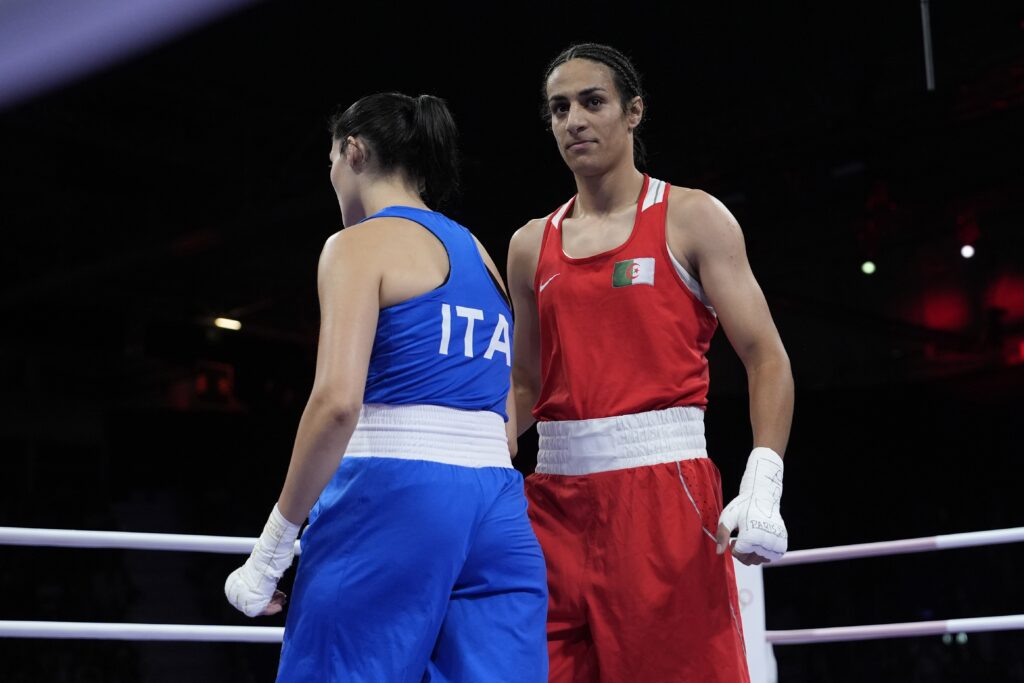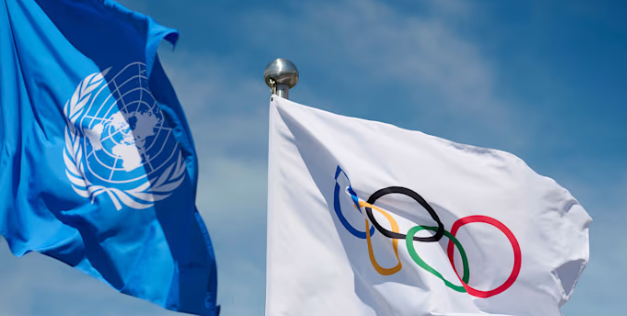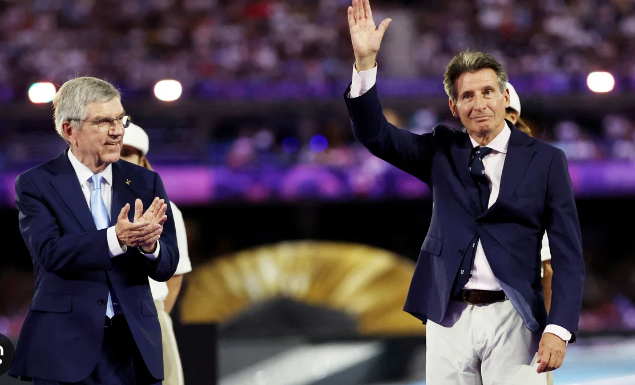The protection of women’s sport and the politics of sex, gender & chromosome doping
November 21, 2024
Olympic running great Seb Coe has fired the starter’s gun in the race to be the next IOC president that could herald a turning point in women’s sport, says Michael Pirrie.
While the globally consequential US presidential elections recently concluded, the campaign to elect a new president of world sport has only just begun with Olympic middle distance running icon, Seb Coe, making the first move in the contest to become next leader of the International Olympic Committee (IOC), sport’s biggest world governing body.
And like the US elections, women’s concerns and issues look set to feature prominently in the Olympic presidential campaign.
Coe, president of World Athletics, the most important Olympic sport, has promised clear policies and procedures to give certainty and confidence around women’s sporting events if elected next IOC president.
“The protection of the female category, for me is absolutely non-negotiable,” Coe said during a series of recent interviews.
“If you are not prepared to do that, and that is where the international federations need a lead to be taken, then you really will lose female sport and I’m not prepared to see that happen.”
Coe’s comments come after two boxers won gold medals in the women’s category at the Paris Olympics after being disqualified from earlier championships for reportedly failing gender chromosome tests.
The controversy and politics surrounding the eligibility of the two boxers in Paris has become a new flashpoint for women’s sport and in society.
Coe is the first in the star-studded candidate field to declare a public position on the controversy, highlighting women’s sport as a key priority in his manifesto to lead the worldwide Olympic Movement.
The other six candidates vying to succeed the outgoing German president Thomas Bach include:
– Spain’s senior IOC and international federation executive Juan Antonio Samaranch Jr
-Zimbabwe’s Kirsty Coventry, Africa’s most decorated Olympic swimmer and athlete representative
-France’s David Lappartient, UCI president and Knight of Legion of Honour (France)
-Japan’s Morinari Watanabe, gymnastics and executive member of the Tokyo Olympic Games Organising Committee
– Sweden’s Johan Eliasch, president, International Ski Federation, and environmentalist
– Jordan’s Prince Faisal bin Al Hussein, executive member of the Association of National Olympic Committees and IOC Executive Board member.
The Paris boxing furore has become a landmark moment in world and Olympic sport.
The controversy has also become a pressing concern for women athletes and sporting bodies looking for guidance on gender eligibility rules and rights of women competing in major sporting events.
While the Paris boxing events did not involve transgender athletes, the controversy has quickly evolved into a wider debate over what defines a woman athlete, triggering an internation storm over gender, diversity, inclusion and equality in sport
This has led to concerns of ‘chromosomal doping’ and fears for the safety and welfare of women competing against athletes with sexual development disorders that provide significant advantages in strength, speed and endurance.
The Paris firestorm over women’s boxing and gender issues was also part of a wider culture war involving transgender ideology and issues in society as well as women’s sport.

The wider cultural, social and community sensitivities from the gender identity storm that engulfed the Paris Games will also need to be managed by Olympic and other sports governing bodies and stakeholders
The fallout from the Paris women’s boxing competition has also become a global concern, attracting the attention of leading international bodies and institutions.
These include the United Nations, which has expressed concerns over the safety, fairness and rights of women in sport.
A post Paris report by a UN specialist on violence against women and girls has raised concerns about the welfare of women athletes from “the intrusion of males in female only sports (which) undermines integrity and safety.”
The report, entitled ‘Violence Against Women and Girls in Sports,’ warns of the risks to women’s safety in gender diverse sporting competitions and environments.
The UN report sounds the alarm on “policies implemented by international federations and national governing bodies, along with national legislation in some countries, (which) allow males who identify as women to compete in female sports categories. In other cases, this practice is not explicitly prohibited and is thus tolerated in practice.”
The report says: “To avoid the loss of a fair opportunity, males must not compete in the female categories,” and human rights positions “must continue to be consistent with science and fact.”
The UN report underscores the relevance of Coe’s concerns and position on protecting eligibility and participation of women in sport.
The UN report, troublingly, says: “According to information received by 30 March 2024, over 600 female athletes in more than 400 competitions have lost more than 890 medals in 29 different sports.”
“It is absolutely vital that we protect, we defend, we preserve the female category,” according to Coe.

There is now growing pressure to resolve women’s gender and eligibility issues well before the next Summer Olympic Games in Los Angeles, and the matter will be a hot button for the next IOC president.
Coe’s strong position on protecting women’s sport may also shape the campaign for the next IOC leader.
Women’s sport is critical to the Olympic Games as the world’s flagship sporting event.
The Games has developed into the largest gender equal sporting event in the world.
Gender equality has been a major focus under Bach’s IOC leadership with the Paris Olympics the most gender equal in history.
The London 2012 Games, delivered by Coe and his organising committee, featured an equal number of sports for women as men for the first time.
This included women’s boxing, in less gender diverse and more binary times for sport and society.
The gender boxing shock that rocked Paris has prompted calls for gender identity and eligibility procedures to be urgently reviewed.
The system failed everyone in Paris – the women involved in the boxing competition and the two medal winning boxers who were raised as females and lived their entire lives identifying as women.
The Paris boxing competition is thought to have been compromised by agendas inside the International Boxing Association, with political and financial links and loyalties to Putin’s Russia.
The Kremlin had implemented a range of strategies designed to disrupt the Paris Games following restrictions on Russian athletes in response to Putin’s apocalyptic invasion.
The war has led to the slaughter of many of Ukraine’s athletes and sporting officials among the thousands of civilians.
The involvement of the pro-Russian boxing federation is believed to have compromised the reliability of information available to Paris Games officials about the background and history of the two boxers designated as women, hampering investigations and decision making at the time of the Games.
Coe and World Athletics, along with World Aquatics, have been at the forefront of developing sex screening protocols to protect the integrity of sporting competitions for women.
The sex screening tests used by the two biggest sports at the Olympic Games helped Athletics and Aquatics to avoid boxing-like gender scandals in Paris and are likely to be more widely implemented in the countdown to Los Angeles.
“There are circumstances in which sex screenings are however, necessary, legitimate and proportional in order to ensure fairness and safety in sport,” the UN report says.
“Current technology enables a reliable sex screening procedure through a simple cheek swab that ensures non-invasiveness, confidentiality and dignity,” according to the report.
Coe’s early intervention also brings a focus to women’s sport more widely and other areas of urgent concern.
Despite a rapid increase in participation and explosion in sporting leagues, competitions, clubs, businesses, funding and opportunities in the sports sector, many women athletes continue to struggle in high-risk sports systems and environments, vulnerable to exploitation, sexual violence, racism and cyber abuse.
The comments by Coe, the two-time Olympic gold medallist, are likely to see protection of women’s sport become a frontline issue in the campaign for the top job in world sport.
CONCLUSION
Coe’s early statements on women’s sport also demonstrate his ability to identify emerging issues that matter to the Olympic Movement and a willingness to address politically, socially, and culturally complex matters that will increasingly impact on Olympic sport. Coe’s commitment to protect women’s sport is significant for the IOC presidential campaign and what the future of women’s sport might look like under a Coe presidency.
It also indicates women’s sport is likely to be an agenda setting campaign issue.
Coe’s early statements of intent to protect women’s sport have also given the presidential contender a first move campaign advantage.
Coe’s comments prioritise the integrity of Olympic sport and athletes as cornerstones of a potential Coe presidency, in a new era of rapid social, cultural and technological change.
Coe’s comments on women’s sport also reflect his laser like focus on the needs, conditions and security of athletes.
This has been Coe’s strategic approach in major roles and positions he has occupied in international sport that have been vital to the Olympic Movement in recent times.
These include Coe’s leadership of the widely acclaimed London 2012 Olympic Games, London 2017 World Athletics Championships and other global competitions.
Coe has also brought in new sponsors, broadcasting and commercial deals and partners along with new events, sports presentation and competition formats, audiences and host cities for athletics, the signature Olympic Games sport.
This followed dramatic reform of the governance of track and field by Coe and his World Athletics board, restoring interest and confidence in the sport that had been fractured by the fallout from Russian doping and internal corruption within the old athletics governing body.
Coe’s statements on women’s sport pave the way for similar announcements by fellow candidates in the high-quality field to identify key issues that will need to be addressed by the next president of the world’s foremost sporting body.
The author of this article Michael Pirrie has worked in senior positions of trust and responsibility for some of the world’s biggest and most complex sporting events and organisations, and was Executive Adviser to the London 2012 Olympic organising committee and chairman Seb Coe.


